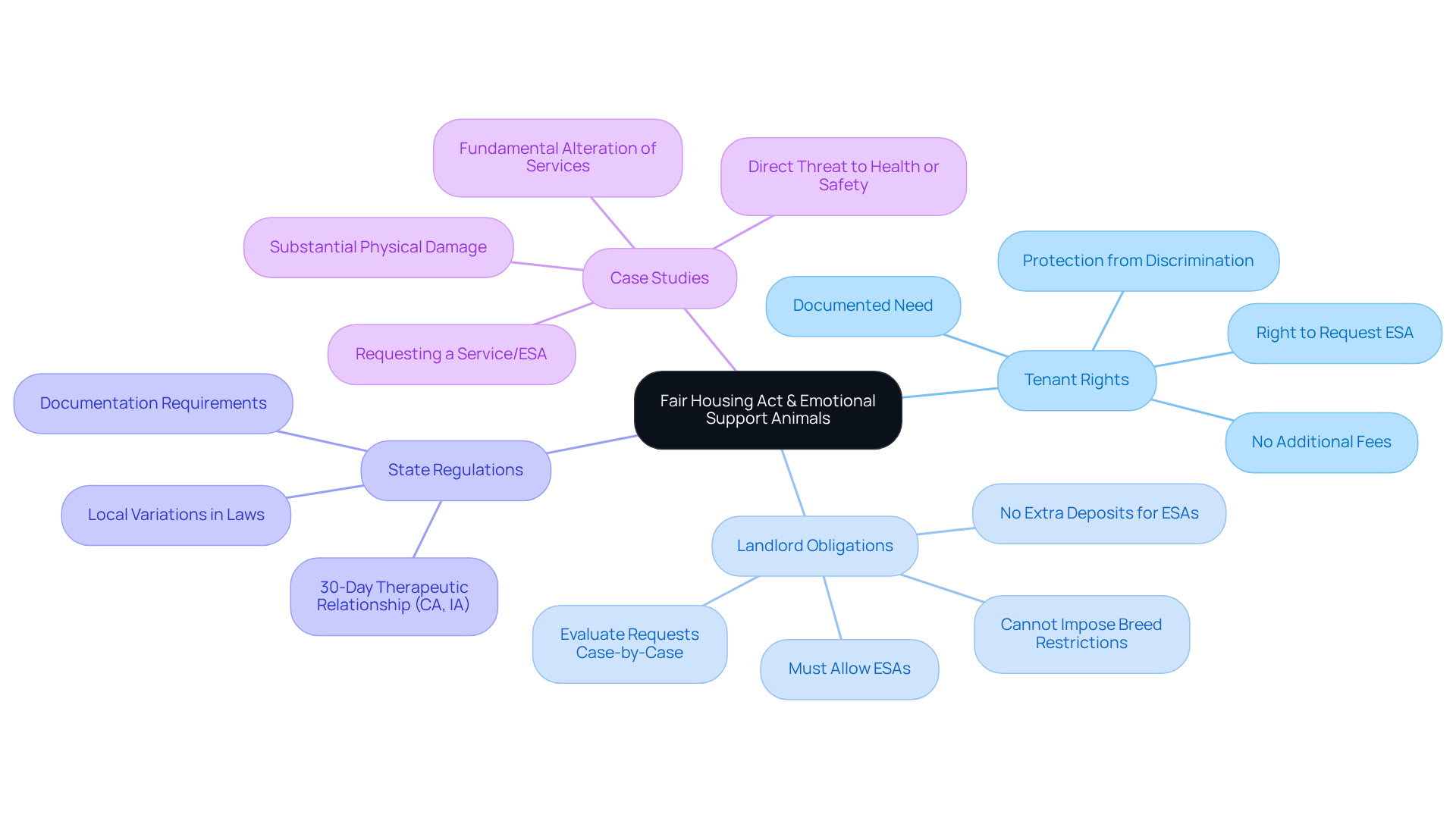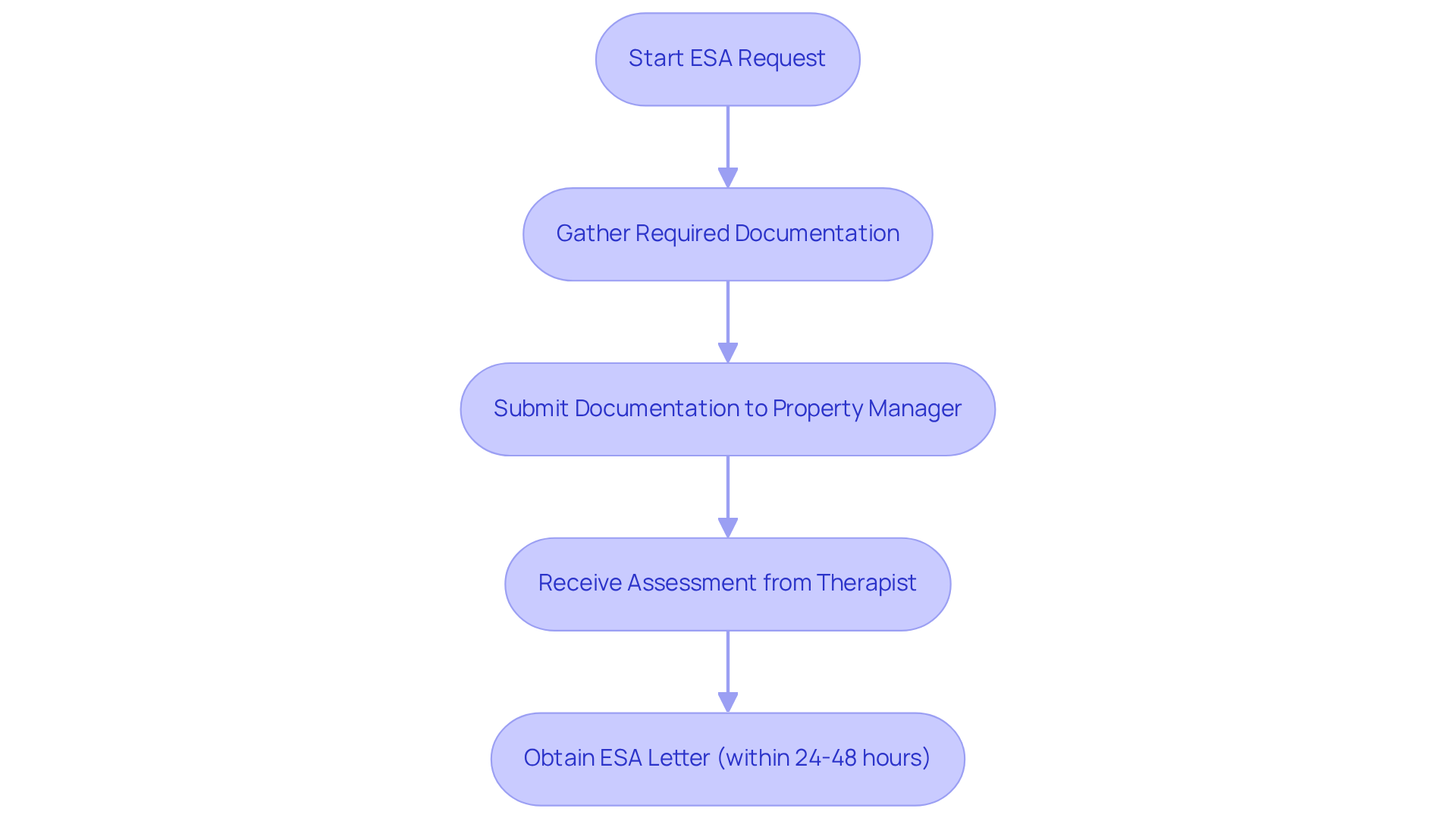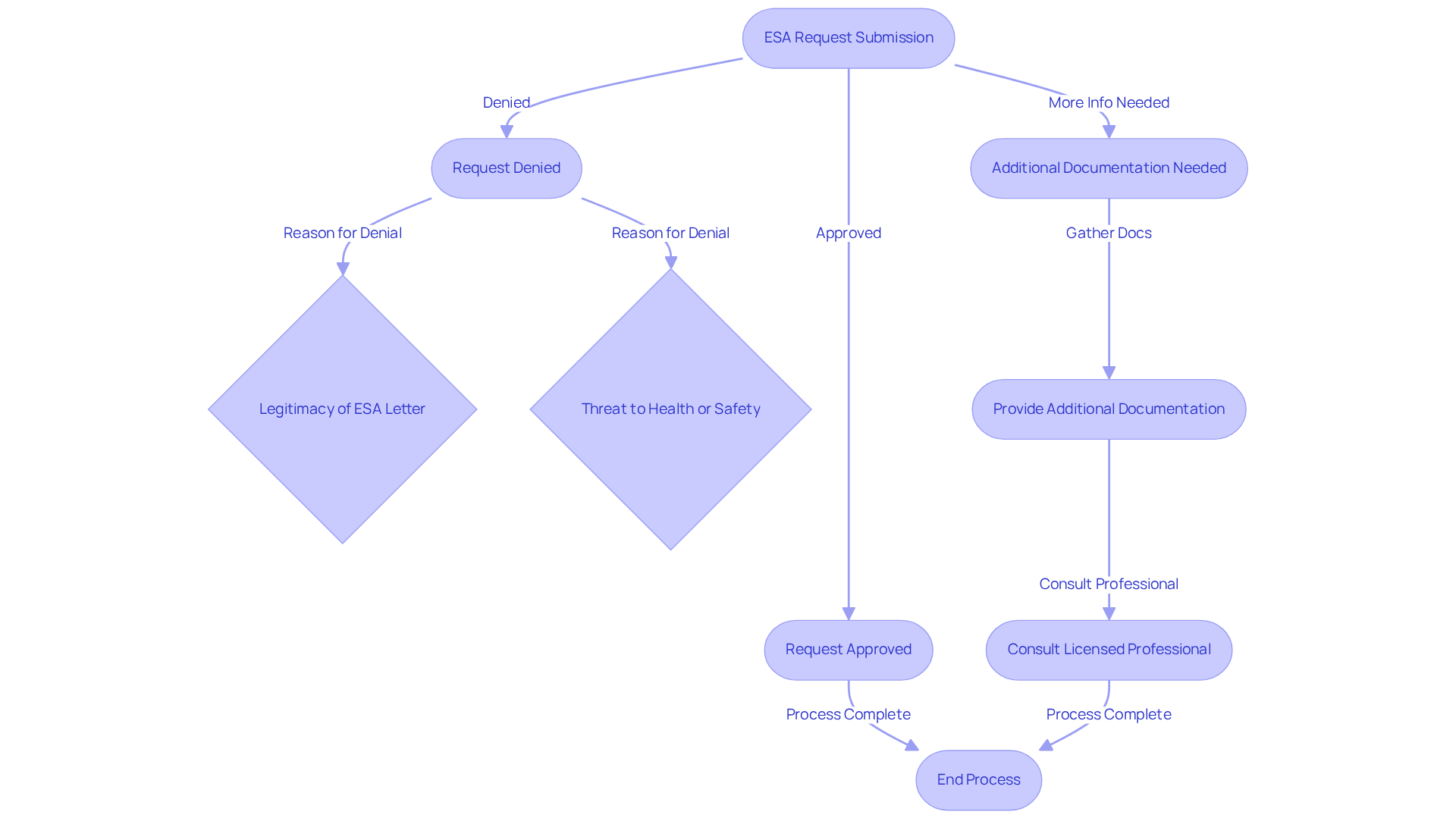

Do Landlords Have to Allow Emotional Support Animals? A Step-by-Step Guide
by Lena Park
Last updated: September 22, 2025
Verified and Approved by:
Angela Morris,
MSW, LCSW
Fact Checked

Overview
For many individuals grappling with mental health challenges, the presence of an emotional support animal (ESA) can be a vital source of comfort and stability. Under the Fair Housing Act (FHA), landlords are generally required to allow ESAs, provided tenants can present valid documentation that confirms their need for such support. This law is designed to ensure that those with documented disabilities receive the accommodations they deserve.
It’s essential to understand that property owners must evaluate ESA requests on a case-by-case basis. They cannot impose additional fees or deny requests solely based on an animal’s breed or size. This legal obligation reinforces the commitment to support tenants who rely on their ESAs for emotional well-being.
By recognizing these rights, we can foster a more compassionate environment where individuals feel understood and supported. If you or someone you know is navigating these challenges, remember that there are resources and support systems available to help you advocate for your needs.
Introduction
Navigating the intersection of mental health and housing rights can feel overwhelming, especially for those seeking the companionship of emotional support animals (ESAs). Individuals with disabilities often face significant challenges, and the Fair Housing Act (FHA) provides essential protections. Yet, many wonder: must landlords allow emotional support animals, even in properties with strict no-pet policies? This article explores the legal landscape surrounding ESAs, offering insights into the rights of tenants and the responsibilities of landlords.
With numerous requests denied each year, understanding the nuances of documentation and best practices is crucial. Renters may encounter various obstacles in ensuring their emotional support needs are met.
How can landlords create a more inclusive environment that acknowledges these needs? By addressing these questions, we can foster a deeper understanding and compassion for those navigating this complex situation.
Understand the Legal Rights Under the Fair Housing Act
The Fair Housing Act (FHA) is a vital piece of legislation that requires property owners to make reasonable adjustments for residents with disabilities. This includes the allowance of emotional support animals (ESAs), raising the question of do landlords have to allow emotional support animals, as they are not just pets but essential companions that provide significant support for individuals facing mental health challenges. This legal distinction is crucial, as it addresses the question of whether do landlords have to allow emotional support animals, even in homes with strict ‘no pets’ policies, provided that residents can supply valid documentation confirming their need for such support.
As we look ahead to 2025, it’s heartening to note that a substantial number of landlords are recognizing the importance of complying with FHA regulations. They understand the therapeutic benefits that emotional support animals can provide. However, it’s essential for renters to be aware of both the FHA and any pertinent state laws that might offer additional protections. For example, states like California and Iowa stipulate that there must be a therapeutic relationship of at least 30 days before an ESA letter can be issued.
Case studies reveal that housing providers must evaluate requests for emotional support animals on a case-by-case basis, taking into account the unique circumstances of each resident. When a renter can demonstrate a documented disability and a clear need for an ESA, do landlords have to allow emotional support animals, as they are obligated to accommodate this request unless there are valid reasons to deny it, such as concerns about potential damage to the property that cannot be mitigated.
Moreover, it’s important to understand that property owners cannot impose additional fees or deposits for emotional support animals, nor can they deny them based on breed, size, or weight limitations. Grasping these legal obligations is crucial for tenants seeking emotional support, as well as for property owners who are navigating their responsibilities under the FHA. Together, we can foster an environment where everyone feels supported and understood.

Gather Required Documentation for Your ESA Request
Requesting an emotional support animal (ESA) can feel overwhelming, especially when you’re navigating the complexities of mental health. To begin this process, it’s essential to present documentation that substantiates your need for the animal, primarily through an ESA letter from a licensed mental health professional (LMHP). This letter should clearly indicate that you have a diagnosed mental health condition and that the ESA is vital for your emotional well-being. It’s important that the letter includes your name, the date, and the professional’s contact information to ensure its validity.
Many individuals face challenges in this journey; research shows that 70% of pet owners are unaware of how to have their pets certified as emotional support animals. This statistic highlights the difficulties that can arise in managing the process. The ESA letter acts as proof from a licensed professional, acknowledging your condition and the necessity of the ESA. This support can significantly enhance your daily functioning and emotional resilience. Additionally, it’s wise to keep copies of all communication with your property manager regarding your ESA request, as this documentation can be invaluable in case of disputes.
As we look ahead to 2025, the process for obtaining an ESA letter remains straightforward. After a brief assessment, you will connect with a licensed therapist who will evaluate your needs. Once approved, you can expect to receive your ESA letter within 24 to 48 hours from providers like Pettable or CertaPet. This efficiency is crucial, particularly given that individuals without an ESA were nearly twice as likely to experience a decline in mental health during the pandemic, with 41% reporting worsening conditions compared to only 21% of ESA owners.
Understanding the criteria for ESA paperwork is vital for safeguarding your rights under the Fair Housing Act, particularly regarding the question of do landlords have to allow emotional support animals without imposing extra fees. By following the proper steps and securing a legitimate ESA letter, you can advocate effectively for your emotional support animal in housing situations, particularly when considering do landlords have to allow emotional support animals. This ensures that you have the support necessary to enhance your mental health and overall well-being.

Implement Best Practices for Landlords in ESA Situations
Landlords have a vital role in creating a supportive environment for tenants who may be facing emotional challenges. It is essential to establish clear policies regarding emotional support animals (ESAs) to clarify whether landlords have to allow emotional support animals in accordance with the Fair Housing Act (FHA). When a renter submits a request for an ESA, it is crucial for property owners to respond promptly and professionally, ideally within a few days. This responsiveness not only nurtures a positive landlord-tenant relationship but also demonstrates a commitment to legal obligations. A thorough examination of the provided documentation is important; landlords should ensure that the ESA letter comes from a licensed mental health expert and confirms the resident’s need for the animal due to a disability.
To ease this process, Wellness Wag offers a streamlined service where residents can consult with licensed medical professionals. After submitting the necessary forms, residents receive a personalized consultation and thorough evaluation to assess their eligibility for an ESA. Once confirmed, they will receive a professionally crafted ESA letter with legal recognition within 24 hours, ensuring that property owners have the documentation needed for review.
It is important for landlords to avoid requesting unnecessary personal information about the tenant’s disability, as this can infringe on privacy rights. If an ESA presents a direct threat to the health or safety of others, or if it causes significant property damage, property owners may have valid grounds to deny the request, raising the question of whether landlords have to allow emotional support animals. However, they must document these reasons thoroughly to mitigate potential legal repercussions. Notably, property owners cannot deny an emotional support animal solely based on breed or size limitations, leading to the question of whether landlords have to allow emotional support animals, as these animals are not classified as pets under HUD guidelines.
Statistics indicate that 75% of tenants have at least one pet, highlighting the growing importance of accommodating emotional support animals in rental properties. Additionally, legal cases concerning ESAs often favor renters, underscoring the necessity for property owners to handle these requests with care and respect. By implementing clear policies and maintaining open communication, property owners can effectively manage ESA requests while ensuring compliance with FHA regulations and fostering a supportive living environment. Wellness Wag’s commitment to HIPAA compliance ensures that tenant privacy is respected throughout this process.

Identify Common Challenges and Exceptions for ESA Acceptance
The Fair Housing Act protects the rights of emotional support animal (ESA) owners, yet navigating the rental process can present significant challenges. Many landlords scrutinize the legitimacy of ESA letters, often questioning their necessity and the qualifications of the issuing professional. In 2025, it was reported that approximately 30% of ESA requests were denied by property owners, frequently due to misunderstandings about the legal requirements surrounding ESAs. Valid reasons for denial can include instances where the ESA poses a direct threat to the health or safety of others or causes substantial property damage. For example, property owners can legally decline an ESA request if they can provide documented evidence of such risks.
To effectively navigate these challenges, residents should be prepared to address property owners’ concerns with empathy and clarity. This might involve providing additional documentation or explaining the therapeutic role of the ESA. Understanding the exceptions to ESA acceptance is crucial; for instance, while property owners cannot deny an ESA based solely on breed or size, they may refuse if the animal’s presence disrupts the living environment or violates safety regulations. The only required document for an ESA is a legitimate ESA letter from a licensed mental health professional (LMHP). At Wellness Wag, we aim to ease this process by helping clients obtain this essential letter through our online platform. Clients can complete a brief assessment to express their emotional support needs, followed by a personalized consultation with a licensed medical doctor. Upon confirmation, clients receive a professionally crafted ESA letter, legally recognized, within 24 hours of their consultation.
By familiarizing themselves with these nuances and utilizing the expertise of licensed professionals at Wellness Wag, both tenants and landlords can cultivate a more cooperative relationship. This understanding ultimately leads to better outcomes for all parties involved, fostering a supportive environment that acknowledges the emotional journeys of those who rely on ESAs.

Conclusion
The discussion surrounding the rights of tenants to have emotional support animals (ESAs) is anchored in the Fair Housing Act (FHA), which mandates that landlords accommodate individuals with disabilities. This legal framework underscores the necessity for landlords to allow ESAs, even in properties with strict no-pet policies, provided that tenants can present valid documentation. Understanding this legislation is crucial for both renters seeking support and landlords navigating their responsibilities, as it fosters a more inclusive environment for those with mental health challenges.
Many individuals face emotional challenges that can feel overwhelming. The importance of proper documentation, such as an ESA letter from a licensed mental health professional, cannot be overstated; it validates the need for an emotional support animal and opens doors to understanding and compassion. Landlords, too, must handle requests with care, ensuring they respond promptly and adhere to legal obligations without infringing on tenants’ rights. The challenges faced by both parties, including misunderstandings about ESA legitimacy and the need for clear communication, highlight the necessity for landlords to implement best practices and maintain a supportive atmosphere.
Ultimately, fostering an environment that respects the rights of tenants with emotional support animals is not just a legal obligation, but a moral one. By understanding the complexities of ESA regulations and working collaboratively, landlords and tenants can create a harmonious living space that acknowledges and supports the emotional well-being of all residents. It is essential for all stakeholders to stay informed about the evolving landscape of emotional support animal laws and to approach these situations with empathy and understanding. Together, we can build a community that nurtures the emotional health of every individual.
Frequently Asked Questions
What is the Fair Housing Act (FHA)?
The Fair Housing Act (FHA) is legislation that requires property owners to make reasonable adjustments for residents with disabilities, including allowing emotional support animals (ESAs).
Do landlords have to allow emotional support animals?
Yes, landlords are required to allow emotional support animals if residents can provide valid documentation confirming their need for such support, even in homes with strict ‘no pets’ policies.
What documentation is needed to have an emotional support animal?
Residents must supply valid documentation, such as an ESA letter, which confirms their need for the animal due to a documented disability.
Are there any state laws that affect the allowance of emotional support animals?
Yes, some states, like California and Iowa, have specific laws that require a therapeutic relationship of at least 30 days before an ESA letter can be issued.
How should landlords evaluate requests for emotional support animals?
Landlords must evaluate requests on a case-by-case basis, considering the unique circumstances of each resident and accommodating requests unless there are valid reasons to deny them.
Can landlords charge additional fees for emotional support animals?
No, property owners cannot impose additional fees or deposits for emotional support animals.
Are there restrictions on the type of emotional support animals allowed?
Landlords cannot deny emotional support animals based on breed, size, or weight limitations.
Why is it important for tenants and property owners to understand the FHA?
Understanding the FHA is crucial for tenants seeking emotional support and for property owners to navigate their responsibilities, fostering an environment of support and understanding.
Certify Your Emotional Support Animal Today

Why You Can Rely on Us?
At Wellness Wag, we believe your pet deserves care rooted in both science and compassion. Each article is carefully researched, written in clear language for pet owners, and then reviewed by qualified professionals to ensure the information is evidence-based, current, and practical for real-life care. Our goal is to help you feel confident in making informed decisions about your pet’s health and well-being.
Reviewed by
Angela Morris, MSW, LCSW
Angela is a licensed clinical social worker with 20 years of experience in patient advocacy and community mental health. She has assisted numerous clients with ESA evaluations and brings a deep understanding of disability accommodations, ensuring that all information is accurate, supportive, and practical.

Written by :
Lena Park
Last Updated :
September 22, 2025












